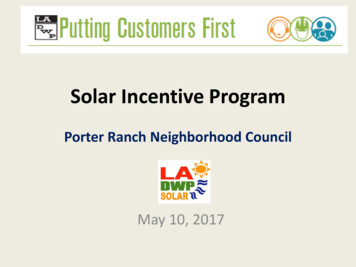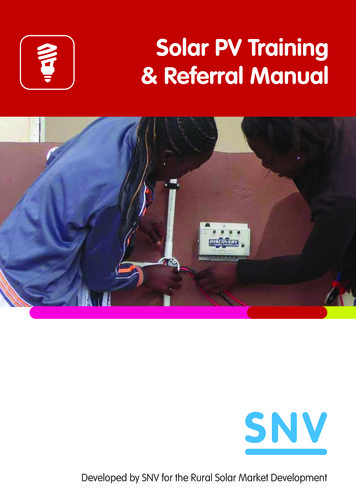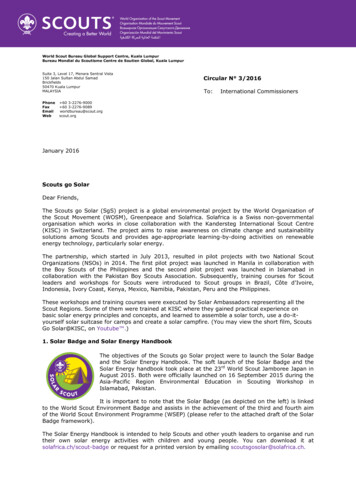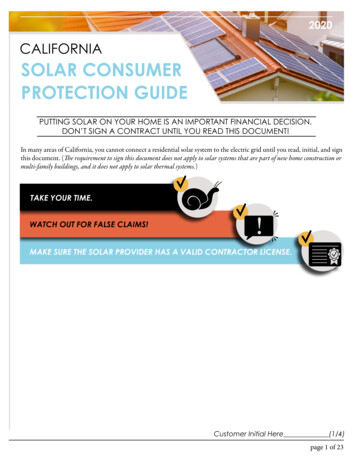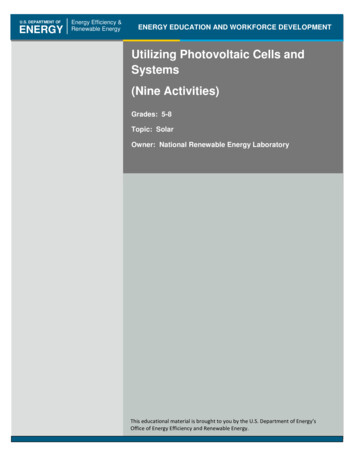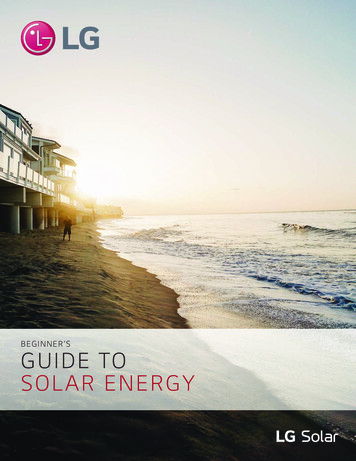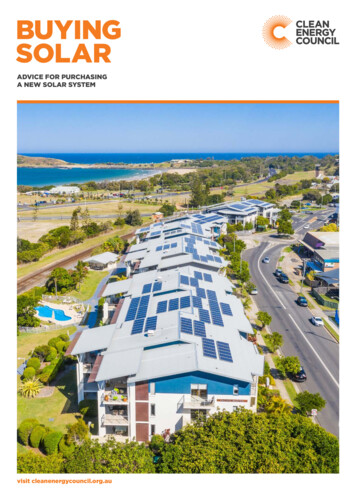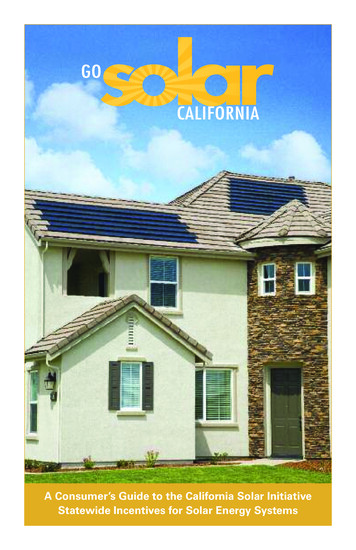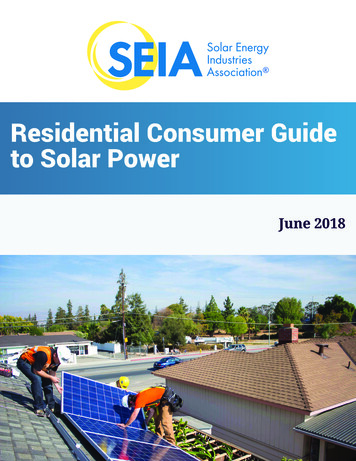
Transcription
Residential Consumer Guide to Solar PowerJune 2018Residential Consumer Guideto Solar PowerJune 2018www.seia.org1
Residential Consumer Guide to Solar PowerIntroductionSolar energy use has grown rapidly over the pastdecade. Costs have dropped, while new ownershipand financing models allow more Americans thanever to choose solar. Solar is now available as apower choice in all fifty states, territories and theDistrict of Columbia. Going solar is a significantdecision. By understanding the basics of solar energy,your solar options, and the right questions to asksolar professionals, you’re well positioned to makethe right decisions.How Solar WorksToday, most residential solar systems are photovoltaic(“PV”) – or solar electric – systems. This guide coversonly PV systems. They generate electricity using twomain hardware components: Panels (or modules) that convert sunlight toelectricity; and Inverter(s) that convert(s) direct current toalternating current for use in your homeGenerating ElectricityThe amount of electricity (measured in kilowatthours, or kWh) produced by any solar systemdepends on two factors: The size (or “power rating”) of the systemmeasured in kilowatts (kW); and The amount of sunlight the system receives.The amount of sunlight a solar system receivesdepends on several factors, including: - Geographic location (e.g., Phoenixreceives more sunlight on average thanSeattle) - Orientation (e.g., roof pitch or compassdirection) - Shading (e.g., from chimneys, trees orneighboring buildings)Your Home Solar OptionsToday, most Americans have options for going solar.It’s important to understand the choices available toyou under state law and the policies of your electric2June 2018utility, the differences among those options, andselecting the right one for you. The main optionsavailable today are bulleted here and explainedfurther below: Purchase a solar system (with cash or a loan)and own both the system and all the power itproduces Lease a system, usually for a monthly rate, andown all the power it produces Enter a “power purchase agreement” (PPA)to buy (in price per kWh) the electricity thesystem producesPurchaseYou can purchase a solar system outright with cashor a loan. When you buy a system, you are theowner of the system and benefit from all electricityit produces. You are usually responsible for systemupkeep, although most residential solar systemsrequire no to low maintenance, and some providersoffer maintenance services on purchased systems.In most jurisdictions, you also are the beneficiaryof any tax credits or other incentives that promotesolar energy. If you sell your home, you may includethe system in the sale just like any other major homecomponent.LeaseIn many markets, you can lease a solar system for aset time period. The solar company owns the systemon your property and leases it to you. You benefitfrom using the electricity the system produces. Thesolar company is responsible for system upkeep. Youmake monthly payments to the solar company at theagreed upon rate specified in the lease for use of thesystem. Some solar companies will allow you to leasewith no initial costs (“no money down”), but that doesnot mean the system is free. Some companies alsogive you an option to purchase the system after acertain amount of time. A lease is one type of thirdparty-owned (TPO) arrangement because the solarcompany (a third-party) owns the system. You haveoptions when selling your home; make sure to askyour solar company before signing a lease.www.seia.org
Residential Consumer Guide to Solar PowerPower Purchase Agreement (PPA)From the consumer perspective, a PPA is very similarto a lease. Under a PPA, you pay for the actual unitsof electricity generated from the system, rather thanleasing the system for a monthly fee regardless ofhow much energy it produces. In a power purchaseagreement (PPA), as with a lease, the solar companyowns the system on your property. Also similar to alease, you agree to purchase the electricity producedby that system for a specified rate and agreed-uponterms specified in a contract. A PPA is also a TPOarrangement because the solar company owns thesystem, but some companies give you the option topurchase the system after a certain amount of time.You have options when selling your home; make sureto ask your solar company before signing a PPA.Energy StorageConsumers are increasingly interested in pairingsolar with energy storage (“solar-plus-storage”).Batteries are currently the most common energystorage product for homeowners. Energy storageis charged when power is available and releasesthe stored electricity when needed. You may lookto install solar-plus-storage systems for backuppower during a power outage, provided you choosethe correct type of storage system. Or you maywant storage to control your electricity generatedby the solar system when connected to a utility: (i)and your utility rate depends on the time of day;(ii) that imposes fixed charges based on your peakusage during a short period of time during themonth that’s difficult to control without storage or(iii) that compensates you for any excess electricitygenerated by your solar system below retail rates(see Understand how you are compensated for excesselectricity below under “Do Your Homework”). Thiscan get complicated quickly, so be sure to ask yoursolar professional about the pros and cons of solarplus-storage in your area to make the right decision.Taking Care of Your SystemBecause PV systems have no moving parts, regularmaintenance is straightforward for a consumer. First,make sure you have enough rain each year to washthe panels. If you live in a desert or highly dustywww.seia.orgJune 2018environment, periodic cleaning is recommendedonce per year with distilled water. The same is trueif you are located near the ocean and receive marinemist that could leave salt deposits. Second, talk withyour solar company about whether you will need totrim nearby branches or do anything with the roof.Third, if your system has monitoring that relies onthe internet, maintain internet connection and learnhow to use your monitoring system. Finally, if yoursystem is not working properly, contact your solarservice provider. Never attempt to repair the systemyourself.Moving ForwardWhen evaluating your options to go solar, you shouldalways do your homework, talk to friends andneighbors who have chosen solar, use common sense,and be active and engaged in dealing with solarcompanies. Below are some suggestions on how tobecome a better-informed consumer.Know Your Situation Know your electricity usage. You shouldunderstand how much electricity your homeuses. Your utility bill will show your electricityusage in kilowatt-hours and the amount youpay for that electricity. Are you planning anychanges that will affect your electricity use,such as buying an electric vehicle, planningan addition to your home, or improving yourhome’s energy efficiency? Does your homealways need electricity even during a poweroutage? Electricity usage can vary significantlybased on your geography and time of year.Discuss your usage with the solar companiesyou interview to get a system sized for yourneeds. Know your electricity rates. Consider howyour electricity bills are calculated. Do yourelectricity rates differ depending on the time ofday? Does your utility charge a fixed monthlyfee based on your peak electricity usage (a.k.a.a demand charge)? Will the utility compensateyou for any extra electricity your solar systemproduces beyond your need, and, if so, at whatrate? These factors can affect the economics ofwhether to go solar.3
Residential Consumer Guide to Solar Power Know your roof. Is your roof appropriatefor solar? Does it receive a good amount ofsunlight or is it mostly shaded? How old isthe roof? If you plan to replace it soon, do sobefore installing a rooftop solar system—yoursolar company may help coordinate with theroofing contractor. In America, roofs facingdue north are not good candidates for solarbecause they don’t receive direct sunlight. Asolar professional can calculate the amount ofsunlight expected to reach a planned system onany roof over the course of a year. Know your finances. Like any major decisionfor your home, it’s wise to understand yourfinances when shopping for solar systems.Although sunlight is free, buying or leasingsolar systems, or paying for electricity under aPPA, are not.Do Your Homework Get the best deal. As with any major purchase,get multiple bids for your solar system project.Many Americans will find the market highlycompetitive, with multiple solar companiescompeting for your business. Make sure you’recomparing apples with apples by closelyreading the terms from different firms. Usethis guide and other resources throughout theprocess. Research your solar company. Beforeentering an agreement with a solar company,do your homework. Ask for references of solarinstallations in your area and call them. Ask forproof of licensure, and check with your countyor state to ensure the firm is in good standing.Ask if they are a member of the Solar EnergyIndustries Association (SEIA), the nationaltrade association for solar that requires all itsmembers to abide by the SEIA Solar BusinessCode. Check with the local Better BusinessBureau and other consumer guides. Understand any tax credits or otherincentives. There is a 30 percent federal taxcredit available through 2019, on the totalcost of the solar system, but only if you ownthe system. The federal tax credit drops to4June 201826 percent for 2020, and 22 percent for 2021,before ending in 2022 for residential systems.Other state and local incentives may beavailable, as well as programs from your localutility. Keep in mind that incentive programscan change, and some may only be availableif you own the system. Many can be foundonline on the Database of State Incentives forRenewable Energy (see “Additional Resources”below). Understand any potential tax implicationsof credits or incentives. Remember, only aCPA can give tax advice and only an attorneycan give legal advice. When consultingsuch professionals, choose ones who areexperienced with solar. Understand how you are compensatedfor excess electricity. Net metering allowsresidential consumers to send electricity thatthey do not use back into the electric grid and“spin the meter backwards.” Although netmetering is widely available, net metering rulesare set by the jurisdiction that you live in andcan change. Some states or service territorieshave moved or are looking to move to differentprograms to compensate you for excesselectricity generated by your system, typicallyat rates lower than what you pay for electricity.Ask your solar professional about the rules inyour area. Understand Renewable Energy Certificates(RECs). RECs or SRECs (Solar RenewableEnergy Certificates) represent the renewablequalities of the electricity your solar systemgenerates. If you own RECs, you can claim youuse “solar” or “renewable” electricity from thesystem. Selling or transferring your RECs canhelp lower the cost of your system, but youcan lose the ability to make “renewable” orsimilar claims about your home. Check yourcontract to see who will own the RECs. It’s anew topic for many residential consumers andsolar companies can explain RECs and RECownership to you if available in your area.www.seia.org
Residential Consumer Guide to Solar Power Understand if PACE is available to you. Insome states, you can finance a solar systemwith Property Assessed Clean Energy (PACE)financing in which you repay over time whatyou borrow using a line-item on your propertytax bill. Not all states allow residential PACEprograms and, among those that do, each state’sPACE program is unique. If you are consideringa PACE program, you need to be familiar withthe rules of your state’s PACE program, ifany. Ask your solar professional and do yourhomework.Understand the Agreement Understand the terms. Contracts are legallybinding and should be read carefully. Makesure you understand what you are receivingfrom the solar company and how much you arepaying. Insist that terms that are important toyou are included in the signed contract. Don’t hesitate to ask questions. The besttransactions are ones where the consumerand the contractor both fully understandthe deal. Asking questions upfront can avoidmisunderstandings later in the process. Beloware some of the top questions that consumersask when entering into a solar transaction. Separate estimates from guarantees. ManyAmericans can save money by choosing solar,but savings depend on the cost of the electricityfrom your solar system compared to cost ofelectricity from your utility. If a solar companypromises savings, or states that electricity costsfrom your utility will increase in the future bya certain amount, ask them to explain. Makesure you understand any assumptions maderegarding future utility rates and rate policies.According to the U.S. Department of Energy,national residential electricity rates increasedon average by 3.4 percent annually between2004 and 2014. Rates in your area may havechanged more or less during that period andmay change more or less going forward. Checkwith your utility or state utility regulatoryoffice for any planned rate changes. Ratesand utility rate policies may change even if nochanges are planned today.www.seia.orgJune 2018 Fully understand warranties. Like any othermajor residential product or service, a solarsystem typically includes warranties coveringparts and labor. There may be separatewarranties for major system components, aswell as how the system interacts with your roofwarranty. Ask your solar company to explainwhat your warranties protect, for how long,and who stands behind them. Know what happens if your company goesunder. While the residential solar industryis booming, like any other industry, somecompanies do go bankrupt. Major componentsof a system (e.g., solar panels) have warrantiesbacked by their manufacturer, so check thecontact information for warranty servicing. Inaddition, there may be companies in your areathat offer maintenance and repair services.Key Questions to Ask BeforeEntering into an AgreementFor all solar systems: What is the total cost of the solar system? How much is the total cost of the solar system ifI add storage? What is your timeline for this investment? How do my options differ if I want a short-termarrangement or a long-term asset? How much do I pay up front, and how muchover time, for how long? What is the system size? How much electricity will the system generateeach year? Do you guarantee a minimumamount (a production guarantee)? Are thereany other guarantees? Will my system be net-metered? How will I becompensated for excess electricity generated bythe system? If there is a blackout, what will happen to mysystem? If I need storage in case of a blackout, what sizesystem and system attributes do I need?5
Residential Consumer Guide to Solar Power Do system output calculations consider actualinstallation details of the system? Can I expect to save money with this system? Ifso, how much? Based on what assumptions? Does installing storage change how much I cansave with this system? If so, how much? Is the installation company licensed andinsured? What will the system look like once installed?Will I receive a system design for my reviewand approval before installation? Will I be required to make any changes to myhome (e.g., roofing upgrades)? Do you use the SEIA residential disclosureform? Can you provide a completed copy of theform?June 2018 What are my rights under state law? Does your company follow the SEIA SolarBusiness Code? Do you agree to abide by SEIA’sComplaint Resolution Process? Is residential Property Assessed Clean Energy(PACE) financing available in my state andlocality? If the company fails, who should I contactregarding panel and inverter warranties andreplacement?For leases and PPAs only: What is the length of the lease or PPA? Who receives solar tax incentives and how arethey factored into the cost? Will my payments increase over time? Howmuch will they increase? Are there separate warranties for parts andlabor? What happens if I wish to end the lease or PPAearly? What do the warranties cover and what aretheir durations? Can I purchase the system, either during theagreement or once it ends? What type of maintenance or cleaning isrequired? Are any maintenance servicesincluded? If not, who should I contact? What are my options when I sell my home? Who deals with the utility and arranges forinterconnection, inspections, and permission tooperate? Is performance of the system monitored and,if so, by whom? How can I monitor systemperformance? Who should I contact if I have a question aboutthe system following the installation? Whoshould I contact if my system stops working? Who will keep the RECs generated by thesystem? Will you retire the RECs on my behalf? Am I free to sell my home or do I need thesystem owner’s permission? Do I have to pay off the lease when my home issold? Can you explain the UCC-1 filing to me? Whathappens if I want to refinance my mortgage? Are there fees to transfer the PPA or leaseagreement to the new homeowner? What are the conditions for a new homeownerto take over the lease or PPA? Who is responsible for repairs andmaintenance on the system? Can you explain how RECs work in mysituation? If I don’t keep the RECs, is there anoption to purchase the RECs? If not, what can Isay about my home? If I want to sell my home and don’t own theRECs, how can I describe my home to potentialbuyers? Can my HOA stop me from installing solar?6www.seia.org
Residential Consumer Guide to Solar PowerWorking Out DifferencesAs with any other service or product, consumers mayencounter issues in dealing with a solar company. Ingeneral, solar companies want satisfied customersand are willing to resolve any problems that arise.SEIA and the solar industry are strongly committed toconsumer satisfaction and protection. First, try to resolve problems directly with yoursolar company. Your contract or lease may have a disputeresolution section and process.June 2018 If you are still having issues, note that SEIAmember companies are bound by the SEIASolar Business Code. If you believe a companyhas violated the SEIA Solar Business Code, youmay submit a complaint to SEIA, which canhelp resolve certain issues. You can contact private consumerorganizations (e.g., your local Better BusinessBureau) about your issue. In addition, state and local governments haveresources to promote consumer protection. Seebelow for more information If you choose a SEIA-member solar companyto work with, SEIA may be able to assist you inresolving your issue. Contact us atconsumer@seia.org.Additional Resources SEIA Consumer Protection Portal – www.seia.org/consumers Official SEIA State Affiliates – www.seia.org/about/seia/official-state-chapters Better Business Bureau (BBB) – www.bbb.org Database of State Incentives for Renewable Energy (DSIRE) – www.dsireusa.org Interstate Renewable Energy Council – www.irecusa.org National Renewable Energy Laboratory (NREL) – www.nrel.gov U.S. Department of Energy (DOE) – www.energy.gov Your state or local consumer agency– www.usa.gov/directory/stateconsumer/ Your state attorney general – www.naag.org Federal Trade Commission (consumer protection)- www.ftc.gov PACENation – www.pacenation.usAs the national solar trade association, SEIAis here to help. Email us with any questions atconsumer@seia.org.www.seia.org7
Residential Consumer Guide to Solar PowerJune 2018About SEIAThe Solar Energy Industries Association (SEIA ) is the drivingforce behind solar energy and is building a strong solar industryto power America through advocacy and education. As thenational trade association of the U.S. solar energy industry, whichnow employs more than 260,000 Americans, we represent allorganizations that promote, manufacture, install and support thedevelopment of solar energy. SEIA works with its 1,000 membercompanies to build jobs and diversity, champion the use of costcompetitive solar in America, remove market barriers and educatethe public on the benefits of solar energy.Explore SEIA’s Consumer Protection Portal:www.seia.org/consumersSolar Energy Industries Association600 14th Street, NW Suite 400Washington, DC .seia.org
Residential Consumer Guide to Solar Power une 201 Introduction Solar energy use has grown rapidly over the past decade. Costs have dropped, while new ownership and financing models allow more Americans than ever to choose solar. Solar is now available as a power choice in all fifty states, territories and the District of Columbia.

